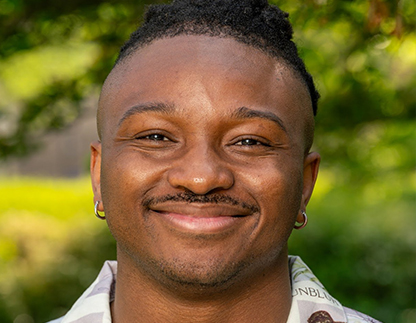At the end of the day, we’re studying the world around us, and the more we learn about the world, the better we are at science.”
Jonathan Doriscar
PhD Candidate in Social Psychology and Master’s Student in Data Science & Statistics

Jonathan Doriscar is a PhD candidate in Social Psychology and master’s student in Data Science & Statistics in the Weinberg College of Arts and Sciences. His research examines how perceptions of self and others are influenced by discrimination, combining traditional experimental methods with computational approaches to analyze large-scale data from digital platforms. Jonathan is a recipient of the National Science Foundation Graduate Research Fellowship and a member of the Bouchet Honor Society.
How would you describe your research and/or work to a non-academic audience?
As a social psychologist, I investigate how we perceive ourselves and others, especially in the context of discrimination. My research combines traditional experiments with computational approaches that draw from data science and sociolinguistics to analyze vast amounts of data—from social media platforms like YouTube, TikTok, and Reddit to digital media outlets such as The New York Times. This allows me to examine how conversations about discrimination have evolved over time.
What is a mistake you have learned from in your career?
Moving too fast. Science should be methodical, thoughtful, holistic, and rigorous—all of which take time and require feedback from others. I’ve learned that when you rush, the quality of your work suffers. More crucial than the number of publications is the quality of the publication itself.
What do you find both rewarding and challenging about your research and/or work?
As a methodologist, determining the most suitable method for a research question is both rewarding and challenging. Experiments are valuable for establishing causality and controlling confounding variables, yet their findings may not always generalize to real-world settings. Conversely, computational approaches can analyze large-scale data, offering insights into naturalistic behaviors, but they may be constrained by data collection limitations and lack transparency in their processes. To address these challenges, I employ a mixed-methods strategy—combining computational techniques to identify real-world patterns with experimental methods to uncover the causal mechanisms underlying these patterns.
What is the biggest potential impact or implication of your work?
My research aims to inform policies that address discrimination on digital platforms. By analyzing extensive data from social media and news outlets, I identify patterns in how discriminatory behaviors manifest and evolve online. These insights can guide the development of targeted interventions and regulations to mitigate such behaviors, fostering a more equitable digital environment.
Why Northwestern?
Northwestern is a place that truly fosters interdisciplinary collaboration and allows for the evolution of research through collaborative and contagiously curious working environments. The entire university—from staff, to undergraduates, to graduate students, to faculty, and even funders—is always receptive to the pursuit of new and challenging research questions. A better question is, why not Northwestern?
How would your closest friends describe you?
My closest friends would describe me as an extrovert—someone who is always thinking, and as a result, always talking. They’d say I’m constantly trying to learn about everyone in the room, making sure people feel comfortable while also pushing them to engage in difficult but meaningful discussions.
What advice would you give your younger self or someone considering a similar path?
I would tell them not to take a "cookie-cutter" approach. What do I mean by that? They don't have to—and I'd even say they shouldn't—only follow the path that's prescribed. Branch out. Take classes in different departments, study abroad, read books on subjects you know nothing about. At the end of the day, we’re studying the world around us, and the more we learn about the world, the better we are at science.
Publish Date: May 13, 2025
If you know a graduate student, postdoctoral scholar, graduate faculty member, staff member, or a member of our TGS alumni population who would make a great candidate for our TGS Spotlight Series, please complete this brief TGS Spotlight Series Nomination Form.